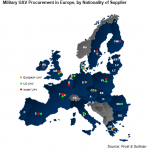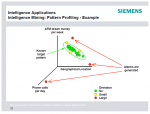Browse: Page 38
By europolice on 12. Oktober 2011
 Endbericht zum TA-Projekt
Endbericht zum TA-Projekt
Mai 2011
Im ersten Jahrzehnt dieses Jahrhunderts ist die Zahl der Einsätze unbemannter Systeme (UMS) in bewaffneten Konflikten wie im Irak und in Afghanistan drastisch angestiegen. Fliegende Systeme waren Hunderttausende Stunden zur Aufklärung und zur Bekämpfung des Gegners im Einsatz, robotische ferngesteuerte Systeme am Boden wurden in unzähligen Missionen, insbesondere zur Entdeckung und Räumung von Sprengmitteln, eingesetzt. Durch die Abstandsfähigkeit solcher aus oft großer Entfernung gesteuerten Systeme wird den Streitkräften die Möglichkeit eröffnet, zahlreiche Missionen bei minimaler Gefährdung von Soldaten durchzuführen, da diese dem Wirkbereich feindlicher Kräfte entzogen bleiben. Dadurch können nicht nur Fähigkeiten wie Nachrichtengewinnung und Aufklärung oder Wirksamkeit im Einsatz verbessert, sondern auch neuartige Optionen auf dem Gefechtsfeld, insbesondere in hochriskanten Einsatzumgebungen, erschlossen werden. Schließlich erhofft man sich durch die Substituierung bemannter durch unbemannte Systeme bedeutende Kostenvorteile. Es werden aber auch Bedenken vorgebracht, dass durch die Option, Einsätze ohne Risiko für die Soldaten durchzuführen, in einer Krise die Konfliktschwelle abgesenkt wird oder das Risiko einer kriegerischen Auseinandersetzung – z. B. infolge eines Unfalls oder eines Versehens – steigt. (pdf auf tab-beim-bundestag.de)
Posted in Drohnen, European Police, Militaer
By europolice on 11. Oktober 2011
 Die EU versucht, die illegale Einreise nach Europa zu erschweren: Seit Dienstag haben alle 25 Mitgliedstaaten des Schengen-Raums Zugriff auf eine zentrale Datenbank der Visa-Antragsteller, in der erstmals auch Fingerabdrücke gespeichert werden.
Die EU versucht, die illegale Einreise nach Europa zu erschweren: Seit Dienstag haben alle 25 Mitgliedstaaten des Schengen-Raums Zugriff auf eine zentrale Datenbank der Visa-Antragsteller, in der erstmals auch Fingerabdrücke gespeichert werden.
Von Nikolas Busse
Die EU hat am Dienstag ein neues Visa-System für den Schengen-Raum in Betrieb genommen, das die illegale Einreise nach Europa erschweren soll. Über eine zentrale Datenbank, in der erstmals auch Fingerabdrücke gespeichert werden, hat nun jeder der 25 Mitgliedstaaten des Schengen-Raums Zugriff auf die Daten aller Antragsteller. Das System läuft zunächst in den europäischen Konsulaten in Ägypten, Algerien, Libyen, Mauretanien, Marokko und Tunesien, soll aber in den nächsten zwei Jahren auf alle 2500 Konsulate der Schengenstaaten in aller Welt ausgedehnt werden. Als nächstes wird es in Nahost und danach am Golf in Betrieb gehen. (weiter auf faz.de)
Posted in Various
By europolice on 11. Oktober 2011
Tripoli/Washington, D.C. – More than 600 migrants from sub-Saharan Africa are effectively stranded at a port just outside the Libyan capital, and have been left to fend for themselves by Libyan authorities. Despite repeated attacks, harassment, and arbitrary arrests by Libyan gangs over the course of four months, they have received no protection from the National Transitional Council (NTC). Refugees International calls on the NTC and all local authorities – including the civilian councils in Janzour and Tripoli, and the Tripoli Military Council – to intervene immediately to protect the population at Sidi Bilal port and ensure their safe relocation to a temporary site.
“The men in these camps are routinely harassed and accused of being pro-Gaddafi mercenaries, the women are targets of sexual abuse. All face intimidation by armed Libyan thugs who drive into the port at night firing guns into the air,” said Matt Pennington, an advocate for Refugees International currently in Libya. “Of course, many migrants told us they don’t really want to leave Libya – since they have nothing to return to in their home countries. But even for those who want to stay in Libya, their situation is becoming intolerable.” Continue reading „Abandoned by Government, Migrants Face Increasing Violence Near Tripoli“
Posted in Border Control, English
By europolice on 10. Oktober 2011
 Die deutsche Firma DigiTask beliefert offenbar nicht nur die Polizei sondern auch Geheimdienste. Starke Indizien dafür finden sich in einer Präsentation des Unternehmens, die ORF.at vorliegt.
Die deutsche Firma DigiTask beliefert offenbar nicht nur die Polizei sondern auch Geheimdienste. Starke Indizien dafür finden sich in einer Präsentation des Unternehmens, die ORF.at vorliegt.
In Sachen Polizeitrojaner überschlugen sich am Montag Abend die Ereignisse. Erst hatte sich die deutsche Bundeskanzlerin Angela Merkel in die Trojaner-Affäre eingeschaltet, bei der immer stärker die Landesbehörden ins Visier geraten.
Dann teilte Bayerns Innenminister Joachim Herrmann (CSU) mit, dass die vom Chaos Computer Club veröffentlichte Software einem Ermittlungsverfahren der bayerischen Polizei aus dem Jahr 2009 zugeordnet werden könne.
Schließlich bestätigte der Rechtsanwalt von DigiTask gegenüber der ARD, dass die Software des Trojaners von der deutschen Firma „DigiTask“ stammt. (weiter auf fm4.orf.at)
Posted in European Police, Remote Forensic, Software/ IT
By europolice on 10. Oktober 2011
 The Council adopted today the new rules for Frontex, the European Agency for the management of operational cooperation at the external borders of the EU (PE-CONS 37/11).
The Council adopted today the new rules for Frontex, the European Agency for the management of operational cooperation at the external borders of the EU (PE-CONS 37/11).
On 13 September 2011, the European Parliament had already given its green light to the compromise agreement reached between Council and Parliament in June. As a last step, the regulation needs to be signed by both institutions. It will then be published in the EU’s Official Journal and enter into force 20 days later, certainly before the end of the year. What’s new?
The revised rules will strengthen the operational capacities of Frontex in a number of areas. The main changes are: Continue reading „New rules on Frontex adopted – Strengthening the European external borders agency“
Posted in Border Control, English
By europolice on 10. Oktober 2011
 Eine Drohne als riesiger Datenstaubsauger: Die Euro Hawk kann Handygespräche abhören und SMS auffangen. Die Luftwaffe will bis zu fünf der Fluggeräte anschaffen.
Eine Drohne als riesiger Datenstaubsauger: Die Euro Hawk kann Handygespräche abhören und SMS auffangen. Die Luftwaffe will bis zu fünf der Fluggeräte anschaffen.
Fast lautlos glitt er aus den Wolken zu Boden. Die Begeisterung, die bei den Zuschauern rings um den Flugplatz Manching aufkam, war fast lauter als die Landung des rund 15 Tonnen schweren „Vogels“. So nennen die Mitarbeiter der dortigen Wehrtechnischen Dienststelle für Luftfahrzeuge im bayerischen Manching fast liebevoll den neuen Helden in ihrer Halle, den Euro Hawk. (weiter auf welt.de)
Posted in Drohnen, Kommunikation, Militaer, Software/ IT
By europolice on 10. Oktober 2011
 As dictatorships slowly begin to topple throughout the Middle East, more and more information is being revealed about the extent to which online activity was monitored in these countries.
As dictatorships slowly begin to topple throughout the Middle East, more and more information is being revealed about the extent to which online activity was monitored in these countries.
The sheer scale of Libya’s Internet monitoring system was revealed when journalists and Libyan rebels gained access to Gadhafi’s intelligence agency, while in Egypt and Tunisia similar discoveries have been made. Software companies from the UK, US, Canada and France have been more than ready to sell their software to known dictatorships.
The latest piece of information that has been revealed in regard to the toppled Tunisian government is not only did a western software company give them the means to monitor their citizens’ activities, they even gave them a discount. (more on freedomdevelopers.com)
Posted in English, European Police, Kommunikation, Software/ IT
By europolice on 10. Oktober 2011
 By Vernon Silver
By Vernon Silver
The European Union will curb the export of telephone- and data-interception technology to nations that use the tools to violate human rights, following reports that Western surveillance gear was used to track dissidents in Middle East crackdowns.
The European Parliament voted today in Strasbourg, France, to bar overseas sales of systems that monitor phone calls and text messages, or provide targeted Internet surveillance, if they are used to violate democratic principles, human rights or freedom of speech.
The legislation leaves enforcement to each of the EU’s 27 member nations. It also lets companies declare exports of the software and hardware 30 days after the gear has left the EU, rather than require prior approval from national authorities, reflecting a compromise reached to get the measure passed. (more on bloomberg.com)
Posted in English, European Police, Software/ IT
By europolice on 10. Oktober 2011
 Last week the European Parliament voted largely in favour of a stronger mandate for Frontex, the EU border control agency. One of the changes is that Frontex is now allowed to buy or lease its own equipment, such as patrol boats and helicopters. New opportunities for the defense industry!
Last week the European Parliament voted largely in favour of a stronger mandate for Frontex, the EU border control agency. One of the changes is that Frontex is now allowed to buy or lease its own equipment, such as patrol boats and helicopters. New opportunities for the defense industry!
Before Frontex was completely depending on EU member states for the provision of its equipment. While its new European Border Guard Teams will still consist of national border guards personnel provided by member states, having its own equipement means Frontex will now be more independent, with greater freedom to act. Frontex also gets an additional 24 million euro – on top if its 88,4 million euro budget for 2011 – to step up maritime surveillance.
The extra funding and the expanded mandate of Frontex come in response to complaints by member state governments and right-winged politicians about its alleged inefficiency in stopping migration to Europe, and the call for strengthening of the EU’s external borders. Continue reading „Frontex – new customer for the arms industry“
Posted in Border Control, English
By europolice on 9. Oktober 2011
 An internal U.S. Department of Homeland Security document indicates that a controversial program designed to predict whether a person will commit a crime is already being tested on some members of the public voluntarily, CNET has learned.
An internal U.S. Department of Homeland Security document indicates that a controversial program designed to predict whether a person will commit a crime is already being tested on some members of the public voluntarily, CNET has learned.
If this sounds a bit like the Tom Cruise movie called „Minority Report,“ or the CBS drama „Person of Interest,“ it is. But where „Minority Report“ author Philip K. Dick enlisted psychics to predict crimes, DHS is betting on algorithms: it’s building a „prototype screening facility“ that it hopes will use factors such as ethnicity, gender, breathing, and heart rate to „detect cues indicative of mal-intent.“
The latest developments, which reveal efforts to „collect, process, or retain information on“ members of „the public,“ came to light through an internal DHS document obtained under open-government laws by the Electronic Privacy Information Center. DHS calls its „pre-crime“ system Future Attribute Screening Technology, or FAST. (more on news.cnet.com)
Posted in English, European Police, Forschung, Software/ IT
By europolice on 9. Oktober 2011
On the 28th and 29th of September, 2011, four persons (two young men and two young women) were detained in Moscow, suspected of crimes under statute 213 part 2 (“hooliganism”) and statute 167 part 2 (“property destruction with arson”) of Russian criminal codex. They are suspected of having committed a bomb attack against traffic police station in 22th kilometre of Moscow ringroad 7th of June 2011, and arson against an excavator in construction site of Volokamski motorway 5th of June 2011. Police did not have any proof about participation of the arrested in these actions, and on the 3th of October all of them were released. Goal of the arrests was solely to pressure anarchists to give testimony with means of psychological and physical torture.
Arrests, searches and interrogations were done as a common operation of UGRO (Criminal Investigation Department), FSB (ex-KGB / intelligence service) and Center E (Center for Counteraction Against Extremism). Also fifth search was committed, at home of anarchist K – his home was searched already second time this year Apparently K was not arrested as he managed to contact his lawyer, who was immediately available for interrogations. Continue reading „Suspected “anarchist guerilla” of Moscow released, but investigations are going on (Russia)“
Posted in English, European Police
By europolice on 9. Oktober 2011
Eine E-Mail informiert Antragsteller über die Nichteinhaltung der 40-Tage-Frist. Der Wiener Jusstudent Max Schrems löst mit seinen Anzeigen eine Welle an Auskunftsanfragen aus.
Seit einigen Wochen sorgt die Studenteninitiative “Europe versus Facebook” (die futurezone berichtete hier und hier) rund um den Wiener Jusstudenten Max Schrems für Aufsehen – sie hat insgesamt 22 Anzeigen gegen Facebook bei der irischen Datenschutzbehörde eingebracht. Facebook hat in Dublin seine Europa-Niederlassung und unterliegt deswegen europäischem Recht. In den Anzeigen bekrittelt die Initiative unter anderem die mangelhafte Löschung von Daten, die automatische Gesichtserkennung, das Nutzer-Tracking mittels Like-Button uvm. (eine Liste gibt es hier).
Auf der Webseite von “Europe versus Facebook” gibt es außerdem eine Anleitung, wie man als Nutzer von seinem Recht gemäß europäischer Datenschutzrichtlinie Gebrauch machen und sämtliche personenbezogene Daten als PDF-Datei auf einer CD-ROM anfordern kann, die ein Unternehmen wie Facebook gespeichert hat. (weiter auf futurezone.at)
Posted in Was tun?
By europolice on 9. Oktober 2011
 Schon seit längerem versucht das BKA in Europa die grenzüberschreitenden Austausch von Daten über sogenannte reisende „Gewalttäter“ (troublemaker) voranzutreiben. Jetzt hat es die wichtigste Datenbank zu diesem Thema, die Zentraldatei „Igast“ (International agierende gewaltbereite Störer) aufgelöst. Allerdings bedeutet dies nicht das Ende der Datensammlung und -weitergabe.
Schon seit längerem versucht das BKA in Europa die grenzüberschreitenden Austausch von Daten über sogenannte reisende „Gewalttäter“ (troublemaker) voranzutreiben. Jetzt hat es die wichtigste Datenbank zu diesem Thema, die Zentraldatei „Igast“ (International agierende gewaltbereite Störer) aufgelöst. Allerdings bedeutet dies nicht das Ende der Datensammlung und -weitergabe.
Bei Gipfelprotesten (in der EU) müssen Aktivist_innen bereits seit 2001 damit rechen, aufgrund fadenscheiniger Gefahrenprognosen ihr Recht auf Reisefreiheit und Meinungsäußerung azu verlieren. Umfangreiche Grenzkontrollen, (militarisierte) Sperrgebiete und vorab verhängte Reiseverbote oder Platzverweise waren und sind ein fester Teil der Repressionsmaßnahmen, die mit politischen Großereignisse einhergehen. Im Zuge des NATO-Gipfels in Straßburg/Kehl und des Klimagipfels in Kopenhagen im Jahre 2009 wurden vorab europaweit Datensammlungen bekannter „troublemaker“ an die örtliche Polizei übermittelt [1] [2].
Das BKA führte zu diesem Zweck seit 2003 die Zentraldatei Igast. Continue reading „Das BKA und die „troublemaker““
Posted in BKA, Border Control, Datenbanken, European Police, Policing Major Events, Was tun?
By europolice on 8. Oktober 2011
 Der Chaos Computer Club (CCC) hat eine eingehende Analyse staatlicher Spionagesoftware vorgenommen. Die untersuchten Trojaner können nicht nur höchst intime Daten ausleiten, sondern bieten auch eine Fernsteuerungsfunktion zum Nachladen und Ausführen beliebiger weiterer Schadsoftware. Aufgrund von groben Design- und Implementierungsfehlern entstehen außerdem eklatante Sicherheitslücken in den infiltrierten Rechnern, die auch Dritte ausnutzen können.
Der Chaos Computer Club (CCC) hat eine eingehende Analyse staatlicher Spionagesoftware vorgenommen. Die untersuchten Trojaner können nicht nur höchst intime Daten ausleiten, sondern bieten auch eine Fernsteuerungsfunktion zum Nachladen und Ausführen beliebiger weiterer Schadsoftware. Aufgrund von groben Design- und Implementierungsfehlern entstehen außerdem eklatante Sicherheitslücken in den infiltrierten Rechnern, die auch Dritte ausnutzen können.
Nicht erst seit das Bundesverfassungsgericht die Pläne zum Einsatz des Bundestrojaners am 27. Februar 2008 durchkreuzte, ist von der unauffälligeren Neusprech-Variante der Spionagesoftware die Rede: von der „Quellen-TKÜ“ („Quellen-Telekommunikationsüberwachung“). Diese „Quellen-TKÜ“ darf ausschließlich für das Abhören von Internettelefonie verwendet werden. Dies ist durch technische und rechtliche Maßnahmen sicherzustellen.
Der CCC veröffentlicht nun die extrahierten Binärdateien [0] von behördlicher Schadsoftware, die offenbar für eine „Quellen-TKÜ“ benutzt wurde, gemeinsam mit einem Bericht zum Funktionsumfang sowie einer Bewertung der technischen Analyse. [1] Continue reading „Chaos Computer Club analysiert Staatstrojaner“
Posted in BKA, Remote Forensic, Software/ IT
By europolice on 7. Oktober 2011
Corporate spies operate in extreme secrecy, but what was police spy Mark Kennedy doing in this furtive world?
We are planning to devote one of the chapters in the book to the subject of corporate spies. Of course, it is a business which loves the shadows, so it is difficult to know exactly how many of them are out there or what they are doing.
Occasionally however some of them are dragged into the sunlight. We know for example about the activities of Toby Kendall who attempted to infiltrate the environmental group, Plane Stupid. Another was Martin Hogbin who was alleged to have penetrated the Campaign Against the Arms Trade for six years.
We plan to look at how corporations have for decades hired spies to infiltrate campaigns which they fear threaten their business. (more on guardian.co.uk)
Posted in English, European Police
By europolice on 5. Oktober 2011
 Colloquium Rethinking Migrations: For Freedom of Movement in the Mediterranean.
Colloquium Rethinking Migrations: For Freedom of Movement in the Mediterranean.
Tunis Sept. 30th – Oct. 1st 2011
The Arab Revolutions of Spring 2011 invite us to reinvent multilateral relations within the Mediterranean See.
Organisations and researchers from South and North have gathered in Tunis under the Colloquium title “Rethinking Migrations: For Freedom of Movement in the Mediterranean”
The participants of this meeting have come to the evaluation that the policies of the European Union, its member states and of the Southern Mediterranean shore have led to a closure of the borders and to obstacles to the free movement of humans. This in disdain of the principles of the international instruments to secure human rights, which guarantee the rights to leave a country, including ones own, as well as the right to return a country of origin. Beyond, these obstacles fully contradict the official discourse of co-operation in the region.
We accuse and claim that what is going on there is in fact a war against migrants, manifested in human rights violations, criminalisation of migrants and the militarisation of the Mediterranean on its borders and shores. Continue reading „Final Declaration: Defending the rights of migrants, rebalancing multilateral relations and liberating migrants movements in the Mediterranean“
Posted in Border Control, English, Was tun? |
By europolice on 30. September 2011
 Gaddafi hatte es längst, in Syrien wurde es jetzt rasch installiert: Das DPI-System wird in Diktaturen als digitale Waffe im Kampf gegen die Opposition benutzt. Gebaut und verkauft wird die Technik zumeist von westlichen Firmen.
Gaddafi hatte es längst, in Syrien wurde es jetzt rasch installiert: Das DPI-System wird in Diktaturen als digitale Waffe im Kampf gegen die Opposition benutzt. Gebaut und verkauft wird die Technik zumeist von westlichen Firmen.
Von Constanze Kurz
Im April 1986 führten die Vereinigten Staaten im Rahmen der Operation „El Dorado Canyon“ Luftschläge gegen Libyen aus, um mutmaßlichen gewaltsamen Anschlägen zuvorzukommen. In den achtziger Jahren war für den Erfolg der Kampfhandlungen die Täuschung des gegnerischen Radars von besonderer Bedeutung, um die libysche Luftabwehr außer Kraft zu setzen. Seinerzeit hatte die Sowjetunion das Abwehrsystem geliefert – die Fronten waren klar.
Heutzutage gehört die Informationstechnik zu den Kampfmitteln – geliefert von westlichen Firmen an den libyschen Diktator. (weiter auf faz.net)
Posted in Datenbanken, European Police, Kommunikation, Remote Forensic, Secret Service
By europolice on 30. September 2011
 I recently spoke to a friend of mine at Denel Dynamics about how exactly the technology they are developing for the weapons industry helps us ordinary people – and one of the projects she told me about was the ugrade of informal settlements in the North-West province – you can’t go more “ordinary” than that.
I recently spoke to a friend of mine at Denel Dynamics about how exactly the technology they are developing for the weapons industry helps us ordinary people – and one of the projects she told me about was the ugrade of informal settlements in the North-West province – you can’t go more “ordinary” than that.
She says SANSA Earth Observation ( SANSA stand for South African National Space Agency) is involved in many local and international impact projects, where the application of satellite data or remote sensing imagery is helping to improve livelihoods, reduce poverty and manage natural disasters.
She says in an informal settlement upgrading programme, the first ever satellite-derived baseline information on informal settlements has increased the ability of the provincial Department of Human Settlements in South Africa’s North West Province to address housing needs and improve the livelihoods of people living in such settlements. (more on earsc.eu)
Posted in English, Space
By europolice on 29. September 2011
 As with enterprise management as noted above, intelligence and investigatory work in the field of counter-terrorism also faces the problem of information overload. One of the primary themes of the findings of the 9/11 Commission was that information pertaining to the unfolding of the 9/11 plot was available within intelligence files and databases, but that analysts had failed to put all the information together. Thus, in the same way that it was able to assist businesses in analyzing internal information, data mining seemed to offer the ability to bring such intelligence information together quickly and automatically to the benefit of overwhelmed analysts.
As with enterprise management as noted above, intelligence and investigatory work in the field of counter-terrorism also faces the problem of information overload. One of the primary themes of the findings of the 9/11 Commission was that information pertaining to the unfolding of the 9/11 plot was available within intelligence files and databases, but that analysts had failed to put all the information together. Thus, in the same way that it was able to assist businesses in analyzing internal information, data mining seemed to offer the ability to bring such intelligence information together quickly and automatically to the benefit of overwhelmed analysts.
In at least some instances, the use of data mining in intelligence and law enforcement merely represents the application of information technology to the same tasks that such agencies have traditionally performed in the past. Thus, data mining may allow these agencies to work in a much faster, more efficient, and perhaps more organized manner than in the past. The ability of data mining to reveal associations that analysts might not think to inquire after may have also offered some hope that data mining would not only assist in performing traditional investigation tasks but could uncover connections or leads that traditional techniques would not. (download doc from detecter.bham.ac.uk)
Posted in BKA, Datenbanken, English, European Police, Forschung, Software/ IT
By europolice on 29. September 2011
 Fuck Mark Kennedy, his crocodile tears, and his fucking documentary.
Fuck Mark Kennedy, his crocodile tears, and his fucking documentary.
Undercover slimeball cop Mark Kennedy is still busy telling lies and conning people, as the forthcoming Channel 4 “documentary” about his activities demonstrates to anyone who actually had dealings with the sleazy scumbag. As every activist who knew him as Mark Stone knows, Kennedy has lied through his teeth in every well-paid interview he’s given. Among the falsehoods Kennedy has spun is that he had it rough while undercover, living on lentil-burgers in dirty squats, and working hard to earn his fat salary. Of course we all know that Kennedy lived the high life, dining in expensive restaurants and spending his time partying and shagging around. The pictures above give a more accurate impression of how Kennedy really spent his time undercover. The macho wanker hoped they’d never see the light of day, well ‘Up yours Kennedy, you fucking creep’! Continue reading „The Photos Mark Kennedy Didn’t Want The World To See“
Posted in English, European Police, Policing Major Events
 Endbericht zum TA-Projekt
Endbericht zum TA-Projekt













